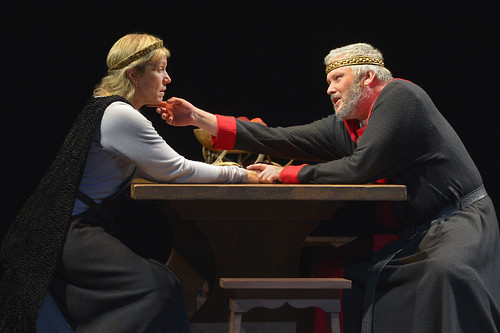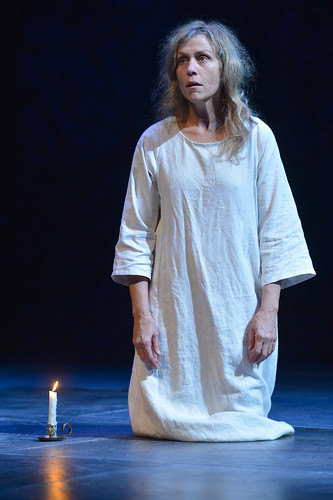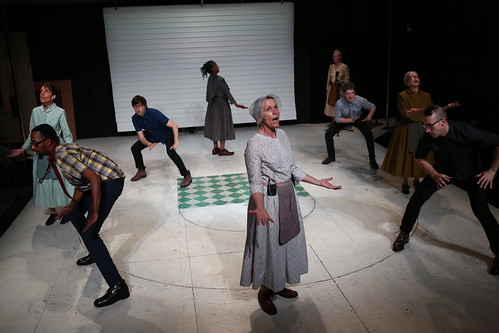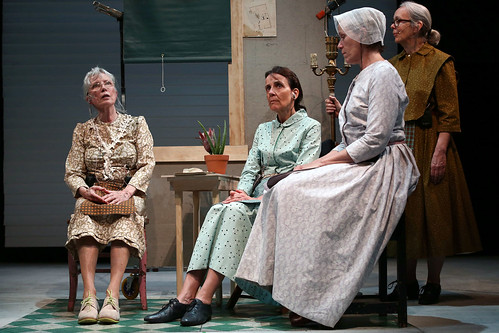
Frances McDormand is Lady Macbeth) and Conleth Hill is Macbeth in Daniel Sullivan’s production of “the Scottish Play” at Berkeley Repertory Theatre. Below: McDormand’s Lady M attempts a challenging feat: hand cleansing while sleepwalking. Photos courtesy of kevinberne.com
Say this for Berkeley Repertory Theatre’s Macbeth now on stage at the Roda Theatre: it stars an Oscar winner, a Tony Winner and an Emmy winner. And she’s doing some interesting things with Lady Macbeth. People are coming to this production to see Frances McDormand try her hand at one of the juiciest roles in the Shakespearean canon, and it’s impossible for McDormand’s genius not to shine through despite the uninvolving production that surrounds her.
There’s a lot of blood in Macbeth, with ritual torture, equal-opportunity murder (men, women, children) and even a beheading, but director Daniel Sullivan delivers a bloodless take on this challenging play. There’s a lot of strutting and fretting in 2 1/2 hours on the stage signifying, sorry to say, mostly nothing.
Aside from the distracting and over-used projections (clearly, projections have become to the live theater what CGI is to film – the easy, go-to solution for sets and effects), this is a fusty, musty kind of Shakespeare where people where pelts, swing swords and intone greatly with only rare connections to what they’re actually saying. The exception is James Carpenter, who plays King Duncan, the drunken porter and Lady Macbeth’s doctor – he makes complete sense of every sentence.
That can make for some dull going, and it stems from, among other things, some serious miscasting and a startling unevenness among the cast.
Game of Thrones star Conleth Hill, who has a wealth of stage experience in the UK and on Broadway, doesn’t make much of an impression as Macbeth. He somehow never seems quite believable in the world the production is trying to create and never shows much of a connection with McDormand’s Lady Macbeth. There’s one powerful moment between the two when they reference the fact that they haven’t ever had children, and McDormand opens up her character to expose a deep source of pain and torment. Hill never really has a moment like that, so his vaulting ambition just comes across as by the numbers ego wrangling.
In addition to that one moment, McDormand, who suffers without a complex, powerful leading man to equal her own complexity, has another stunning moment at the end of the famous sleepwalking scene when, with great vulnerability, she reveals that she might not be sleepwalking after all.
I’ve always been disappointed that Shakespeare never let us see Macbeth and Lady Macbeth together late in the play, each dealing with guilt and regret in different ways, and that absent scene is sorely felt here because it seems McDormand is really on to something here.
Among the scenes with the most crackle is one between Lady Macduff (Mia Tagano) and her son (the excellent Leon Jones) as she bitterly discusses her husband as a traitor and a liar and any scene involving the three witches played by McDormand (with a billygoat beard), Tagano and Rami Margron). We first see the witches torturing a man tied to a tree, and though they’re competing with way too much stage smoke, they are direct and creepy. When we see them again at the height of Macbeth’s mania, they are the perfect embodiment of that dangerous and destructive need for power (and fame and wealth and anything else that effectively separates us from our humanity). Sometimes the “toil and trouble” spell casting can be funny rather than unsettling, but here the witches conjure appropriate anxiety.
It would seem, in this contentious and bullying political climate, that Macbeth would be the right play at the right time. Perhaps it is, but you wouldn’t really know it from this production.
FOR MORE INFORMATION
William Shakespeare’s Macbeth continues through April 10 at Berkeley Repertory Theatre’s Roda Theater, 2015 Addison St., Berkeley. Tickets are $35-$125 (subject to change). Call 510-647-2949 or visit www.berkeleyrep.org.



